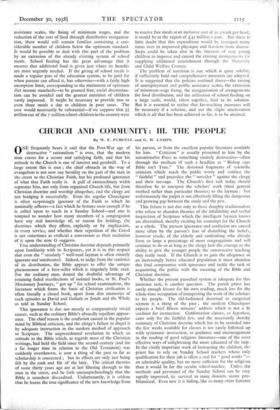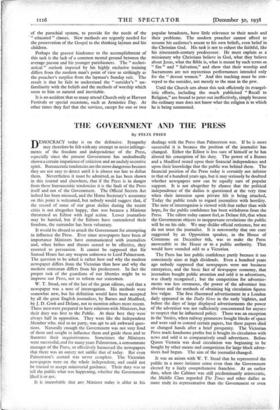CHURCH AND COMMUNITY: III. THE PEOPLE
By W. E. PURCELL and G. W. LAMPE
ONE frequently hears it said that the Post-War age of destructive " rationalism " is over, that the modern man craves for a secure and satisfying faith, and that his attitude to the Church is one of interest and goodwill. To a large extent this is true ; the chief obstacle in the way of evangelism is not now any hostility on the part of the man in the street to the Christian Faith, but his profound ignorance of what that Faith really is. A gulf of extraordinary width separates him, not only from organised Church life, but from Christian doctrine and worship altogether, and the clergy are not bridging it successfully. Even the regular Churchgoer is often surprisingly ignorant of the Faith to which he nominally adheres—a fact which he betrays soon enough if he is called upon to teach in a Sunday School—and one is tempted to wonder how many members of a congregation have any real knowledge of, or reason for holding, the doctrines which they affirm, explicitly or by implication, in every Service, and whether their repetition of the Creed is not sometimes as artificial a convention as their recitation of it upon the note G suggests.
True understanding of Christian doctrine depends primarily upon familiarity with its Scriptures, yet it is in this respect that even the " secularly" well-read layman is often entirely ignorant and uneducated. Indeed, to judge from the statistics of its distribution, the Bible appears to offer the unique phenomenon of a best-seller which is singularly little read. For the ordinary man, denied the doubtful advantage of retaining faded recollections of isolated books, or St. Paul's Missionary Journeys, "got up" for school examinations, the literature which forms the basis of Christian civilisation is often literally a closed book, apart from dim memories of such episodes as David and Goliath or Jonah and the Whale as told in Sunday School.
This ignorance is due not merely to comparatively trivial causes, such as the ordinary Bible's absurdly repellent appear- ance. The chief reason is the confusion caused in the popular mind by Biblical criticism, and the clergy's failure to dispel it by adequate instruction in the modern method of approach to Scripture. The unprecedented revolution in which an attitude to the Bible which, as regards most of the Christian writings, had held the field since the second century (and for a far longer time in relation to the Old Testament) was suddenly overthrown, is now a thing of the past so far as scholarship is concerned ; but its effects are only just being felt by the rank and file of the laity. The critical theories of some thirty years ago are at last filtering through to the man in the street, and he feels uncomprehendingly that the Bible is somehow discredited. Unfortunately, it is seldom that he learns the true significance of the new knowledge from his parson, or from the excellent popular literature available for him. " Criticism " is usually presented to him by the sensationalist Press as something entirely destructive—often through the medium of such a headline as "Bishop says Bible isn't True." The distorted fragments of scientific criticism which reach the public worry and confuse the " faithful " and prejudice the " outsider " against the clergy and their message. The Church's first task today should therefore be to interpret the scholars' work (their general method rather than particular theories) to the layman : but unfortunately the pulpit is not effectively filling the dangerous and growing gap between the study and the pew.
This failure is not due only to those doughty traditionalists who refuse to abandon theories of the infallibility and verbal inspiration of Scripture which the intelligent layman knows are discredited, thereby exciting his contempt for the Church as a whole. The present ignorance and confusion are caused more often by the parson's fear of disturbing the beliefs, however crude, of the elderly and unthinking who already form so large a percentage of most congregations and will continue to do so as long as the clergy lack the courage or the ability to give the younger people the constructive teaching they really need. If the Church is to gain the allegiance of an increasingly better educated population it must abandon this fatal compromise with ignorance and tackle the task of acquainting the public with the meaning of the Bible and Christian doctrine.
Whether the present parochial system is adequate for this immense task, is another question. The parish priest has rarely enough leisure for his own reading, much less for the whole-time occupation of interpreting the work of the scholars to his people. The old-fashioned doctrinal or exegetical sermon is a thing of the past ; the modern Churchgoer .expects a brief fifteen minutes' address which is not a fit medium for instruction. Confirmation classes, ex hypothesi, cater only for the faithful few, and the necessarily sketchy summary of Christian doctrine which has to be crowded into the few weeks available for classes is too rarely followed up with systematic instruction, or guidance and encouragement in the reading of good religious literature—one of the most effective ways of enlightening the more educated of the laity. In the vitally important work of instructing the children, the priest has to rely on Sunday School teachers whose only qualification for their job is often a zeal for " good works "- an admirable quality, but no more sufficient for the religious than it would be for the secular school-teacher. Unless the -methods and personnel of the Sunday School can be very rapidly improved, its survival in many districts seems pro- blematical. Even now it is failing, like so many other features of the parochial system, to provide for the needs of the " educated " classes. New methods are urgently needed for the preservation of the Gospel to the thinking layman and his children.
. Perhaps the gravest hindrance to the accomplishment of this task is the lack of a common mental ground between the average parson and his younger parishioners. The " ecclesi- astical " outlook imposed by his highly exclusive training differs from the modem man's point of view as strikingly as the preacher's surplice from the layman's Sunday suit. The result is that he fails to understand the " outsider's " un- familiarity with the beliefs and the methods of worship which seem to him so natural and inevitable.
It is no accident that so many attend Church only at Harvest Festivals or special occasions, such as Armistice Day. At other times they feel that the services, except for one or two popular broadcasts, have little relevance to their needs and their problems. The modem preacher cannot afford to assume his audience's assent to his own beliefs, even belief in the Christian God. His task is not to exhort the faithful, like his nineteenth-century predecessor. He must explain as a missionary why Christians believe in God, what they believe about Jesus, what the Bible is, what is meant by such terms as• " Sin " and "Salvation," and show that their worship and Sacraments are not mysterious performances intended only for the "devout women." And this teaching must be con- veyed to the outsider, not merely to the man in the pew.
Until the Church sets about this task efficiently its evangel- istic efforts, including the much• publicised "Recall to Religion," are bound to peter out ineffectively, simply because the ordinary man does not know what the religion is to which he is being summoned.



































 Previous page
Previous page